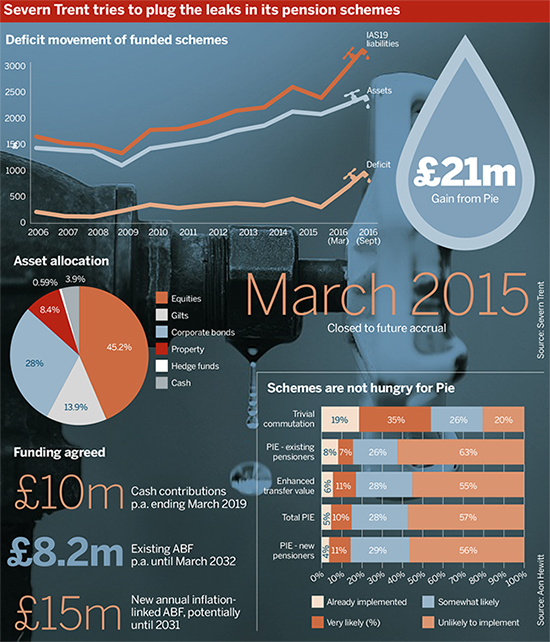The Severn Trent Pension Scheme has agreed a new asset-backed funding strategy with its sponsor, following a year which saw its accounting deficit more than double despite derisking measures.
The £2.24bn fund also carried out a pension increase exchange, from which water company Severn Trent was able to record an exceptional gain of £21m.
If the deficit increase might materially impact the employer’s ability to support the scheme, then actually you should be looking very carefully at derisking
Charles Cowling, JLT Employee Benefits
Experts said Pie strategies have seen heightened interest in recent months, as schemes look to offset the impact of an expected uptick in inflation.
Deficit doubles post Brexit vote
However, it was interest rates and bond yields that caused the fund the most pain over the year. Despite an increase in the fair value of assets, the scheme’s and its smaller mirror image scheme’s combined accounting deficit climbed to £711.7m as at September 2016, from £309.5m six months earlier.
“The sharp decrease in corporate bond yields since the year end... has driven an increase of almost 26 per cent in the accounting valuation of the schemes’ liabilities,” Severn Trent noted in its half-year report and accounts.

“This was only partially offset by the good performance of the schemes’ assets, particularly equities, and the progress made on derisking the scheme from changes in interest rates,” it said.
Corporate bond yields slumped after the UK’s vote to leave the EU. The timing of Severn Trent’s report has not been favourable for the utilities firm – which other companies will experience as they reach their half-year report dates. While trustees will know to look past movements in accounting deficits, such swings can hurt the sponsor and its share price.
“That’s really something more for the employer to be concerned about than the trustees, but that’s not to say that the employer might not want to encourage the trustees to reduce risk,” said Charles Cowling, director at consultancy JLT Benefit Solutions.
Interest rates or inflation?
Where such derisking should focus is a key question for schemes. Interest rate hedging has been at the top of agendas for several years, but experts agree that there are now concerns over long-term inflation as well.
Cowling said inflation hedging might be the more pressing issue for schemes but warned against calling the bottom on yields, given the prevailing low rates over the past six years. He said derisking should be undertaken with regard to the employer’s strength.
“If something like this going wrong might materially impact the employer’s ability to support the scheme, then actually you should be looking very carefully at derisking,” he said.
Cherrypick your assets
The scheme does appear to have strong funding from Severn Trent, with the trustees and sponsor agreeing a new strategy in advance as part of the 2016 actuarial valuation.
Severn Trent pledged £10m in cash contributions every year for the next three years, to be topped up by yearly inflation-linked asset-backed payments of £15m, which could be made from March 2017 until 2031 if required.
“These contributions will cease earlier should a subsequent valuation of the STPS show that these contributions are no longer needed,” the report noted. It did not disclose the nature of the assets used to back funding. An existing asset-backed funding arrangement already provides £8.2m a year until 2032.
The ability to recover excess contributions is part of what makes asset-backed funding so attractive to employers, according to Alan Collins, head of trustee advisory services at Spence & Partners. But he urged trustees to be prudent in assessing the quality of the assets offered. “Is that going to give them a better deal than straight cash?” he said. “If you’re given an asset to back the funding that becomes worthless on insolvency, then it’s not very good.”
Weir Group cuts deficit contributions with 15-year funding vehicle
Weir Group established a Scottish Limited Partnership with the trustee of its main defined benefit scheme last year, allowing the group to reduce its deficit recovery payments while adding to the security of members’ benefits.
Who's for Pie?
The Severn Trent trustees also implemented a pension increase exchange, which offers members a higher initial sum in exchange for giving up their non-statutory inflation linkage.
Ben Roe, head of liability management at Aon Hewitt, said there has been an increase in interest in Pie arrangements in recent years and that with the right approach, they can benefit all parties. He stressed the importance of communication “so that people can make an informed choice”.

























